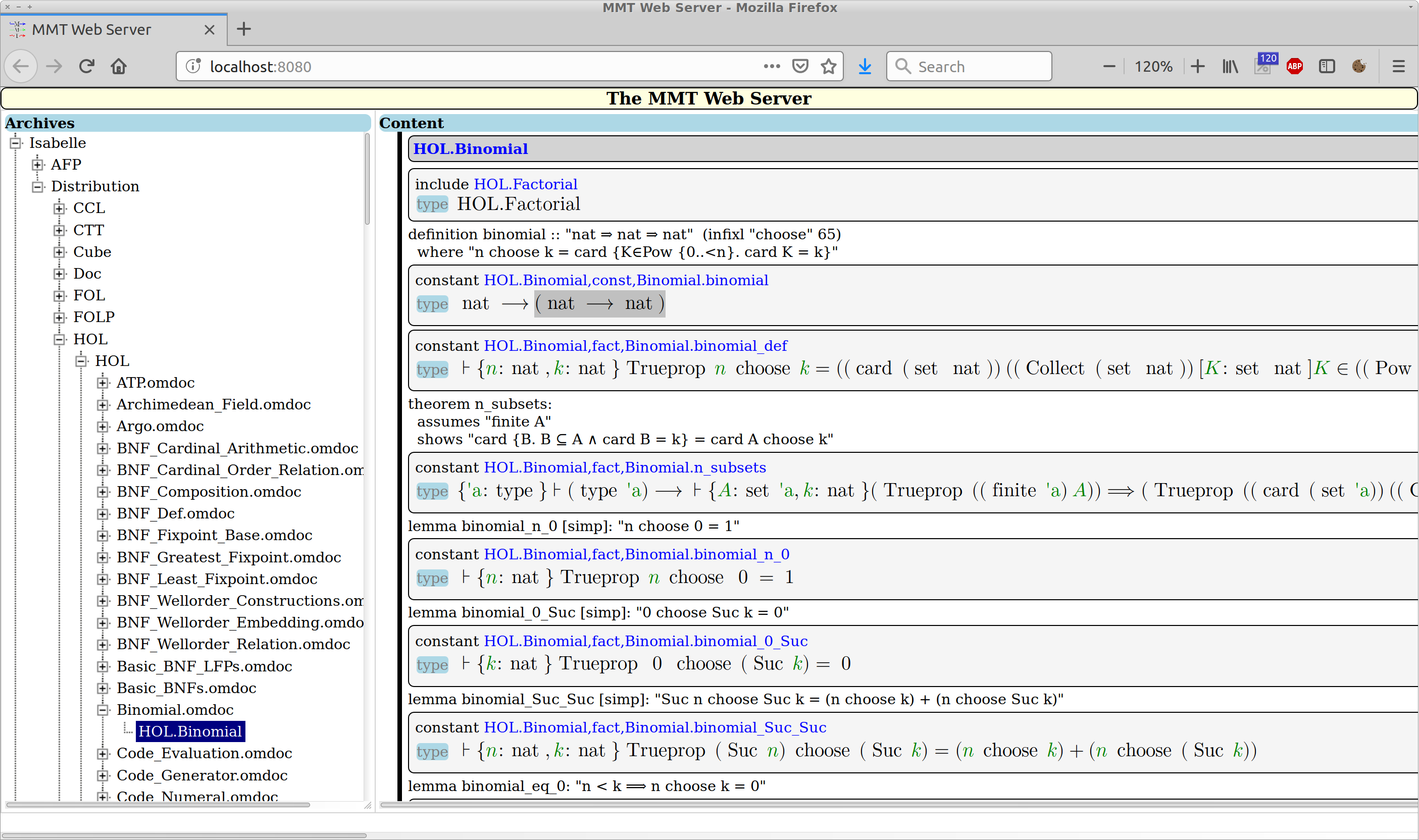MMT (or “Meta Meta Theory”) is a general framework for formal and informal languages, including lambda-calculus and logic, but also text documents. The documentation provides an overview of the MMT language and system (which is implemented in Scala).
I have collaborated over some months with the makers of MMT: Florian Rabe and Michael Kohlhase. The outcome is Isabelle/MMT, a tool in Isabelle/Scala that uses the MMT library to export Isabelle theory content and import it into MMT as OMDoc files. Robustness and scalability have been of primary concern of Isabelle/MMT: We have managed to process recent Isabelle + AFP within 6.5h on high-end hardware, excluding only very big sessions of AFP (notably the “slow” group).
Here are further technical details:
- Intel Xeon CPU E5-2699 @ 2.20GHz with 20 cores
- Poly/ML: 30 GB heap size, approx. 12 active threads
- Java 11: 30 GB heap size, approx. 2 active threads
- 540 sessions
- 5463 theories
- 1404441 logical items:
- 4021 locales (including classes)
- 4057 locale dependencies (sub-locales, sub-classes etc.)
- 1101 type-classes
- 9620 types
- 191336 constants
- 1194306 theorems
- 160 MB OMDoc content with XZ compression, or 26 GB uncompressed
The resulting OMDoc content is available from the MathHub service by Kohlhase and Rabe. It is possible to browse it locally via the HTTP server that is included in MMT, e.g. by the command-line wrapper isabelle mmt_server. See also the README (towards the bottom) and the following screenshot:

Browsing only works smoothly for small Isabelle theories. The Scala APIs of MMT provide more scalable access to the massive amount of material, e.g. it could be used for “data-mining” of Isabelle/AFP content.
Isabelle export
The Isabelle/MMT export uses new mechanisms from recent repository versions (after the Isabelle2018 release), e.g. see Isabelle_09-Nov-2018. In particular:
- Export of “blobs” into the Isabelle session database, e.g. see the
export_theory system option and the isabelle dump tool. In such batch-mode tools, exports are written to an SQLite database and dumped to the file-system.
- Use of PIDE (Prover IDE) processing under program control: the database content is maintained within the running Java process and later written to OMDoc files. The PIDE session allows to export many details of formally annotated sources: presently only the source positions of declared types, constants, theorems etc. are reconstructed and associated with the corresponding command-span in the text.
Other applications of theory export may be considered, e.g. OpenTheory or Dedukti, but note that proof objects are presently omitted. Full proof terms would require some orders of magnitude more resources. Instead, it is probably better to use structured Isar proof texts with formal PIDE annotations.
MMT import
Import into MMT uses the existing LF library, which provides a Logical Framework that is similar to Isabelle/Pure. Isabelle types, terms, propositions are translated in a straight-forward manner. Type-classes of Isabelle occur here as classes of types, without any additional structure yet. Further theory structure is provided by locales — classes are locales with special link-up with the type-system. Overall we get the following aspects of Isabelle theory content in MMT:
- Foundational theory content: type-classes, types, terms (constants), theorems (facts).
- Locales (and classes) as “little-theories”: with some information about locale dependencies and locale interpretations.
- Limited mixfix/infix syntax for global constants and locale constants.
- Original source text for Isabelle/Isar commands that introduce formal content.
More details are possible: Isabelle content is very rich, with many extra-logical aspects. The “flexiformal” approach of MMT might eventually help to express a lot of this, beyond the standard Logical Framework approach.
